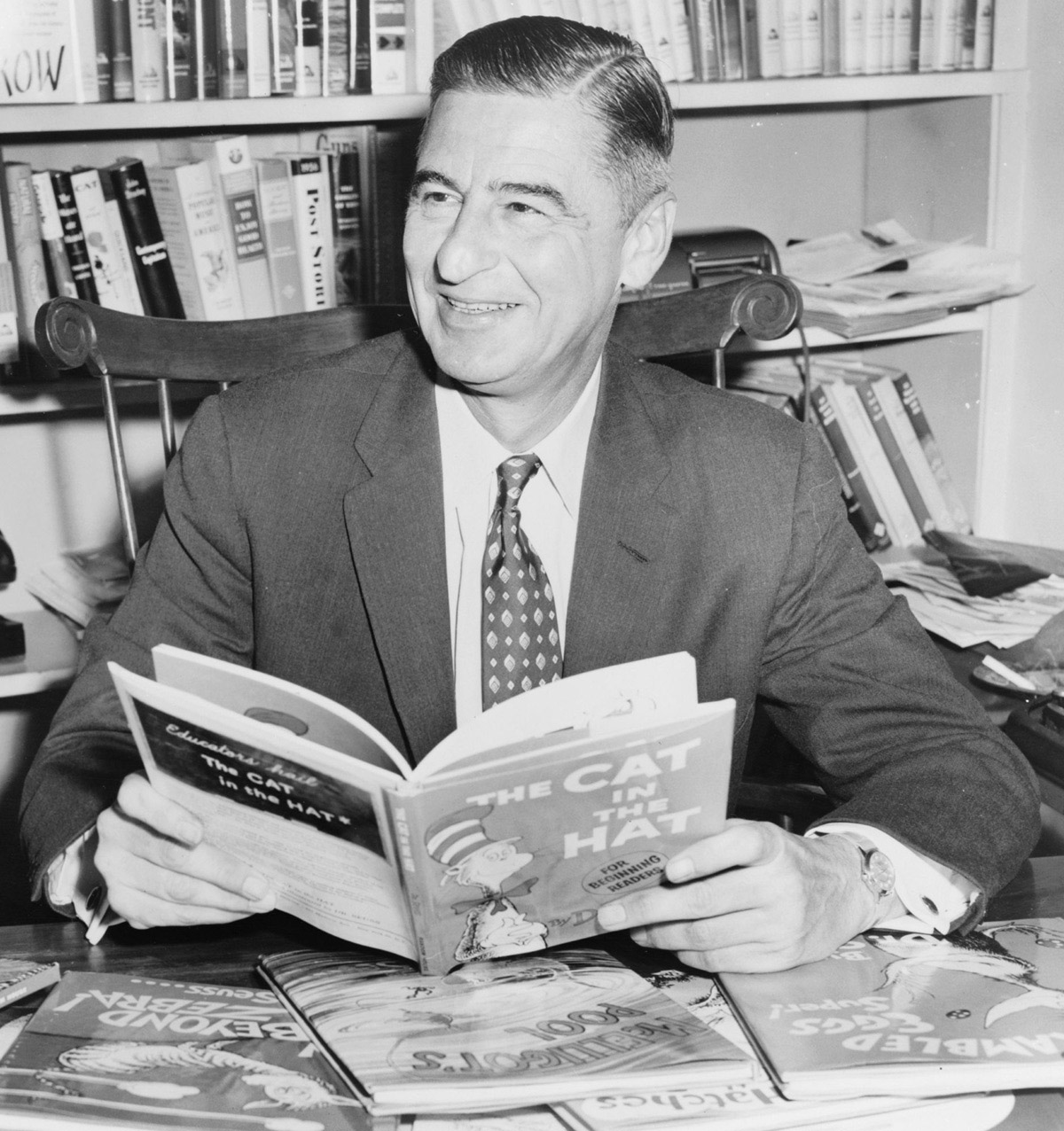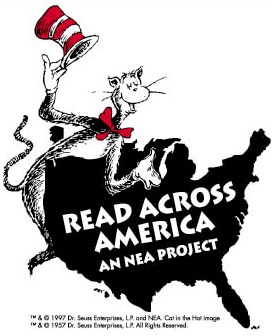
Noting the rise in “adult” authors writing for children, Dr. Seuss in November 1960 published an article in which he argued that children’s books were more important than other types of books – because children’s books had the potential to be more influential than all other books.
I’m reproducing it below exactly as it appeared in the Los Angeles Times, on 27 Nov. 1960.  For this reason, the fanciful claim that Seuss was “mayor of La Jolla” remains, even though Seuss or his editor was just kidding.  (Theodor Seuss Geisel lived in La Jolla, California, but he wasn’t mayor.)
Writing for Children: A Mission
(Dr. Seuss is one of the world’s best-known writers and illustrators of children’s books. He is editor and president of the beginner book division of Random House, and, in his other identity, is mayor of La Jolla)
BY DR. SEUSS
Some 23 years ago I made a move that most of my writer friends acclaimed as the height of stupidity.
I walked out on a fairly successful career as a writer who wrote for great, big grown-up adults and began to write for the Kiddie-Kar and Bubble-Gum set.
This, in the 30s in the writing profession, was not a sign of going forward. This was a step down. At that time, the attitude of most of this country’s top writers was: writing for children is literary slumming. With a few notable exceptions, they wanted no part of scribbling for little girls who played with dollies and for little boys who had not yet shaved.
Flood of Treacle
And, to a certain degree, these authors were right. In those days, an appalling percentage of books for children were concocted out of inept, condescending, nature-faking treacle. They insulted the intelligence not only of the child, but also of the people who write them. They were batted out, hippity-hoppity, by amateurs and semi-pros with little or no experience in the very tough-to-learn craft of writing.
The funny part –Â and the happy part –Â of this brief historical essay is this:
Those same top professional writers who, a few years back, wouldn’t be caught dead with their name on a brat book are today writing enthusiastically in the juvenile field. More and more of them every year.
I think that writers have finally realized that children’s reading and children’s thinking are the rock bottom base upon which this country will rise. Or not rise.
New-Found Potential
In these days of tension and confusion, writers are beginning to realize that books for children have a greater potential for good or evil, than any other form of literature on earth.
It is the awareness of this is now bringing so many fine top writers into the once-despised juvenile field. To be sure, the field is still full of the dispensers of mush, still hippity-hopping around their Maypoles and still ladling out their lukewarm treacle.
But the children are absorbing treacle in ever-decreasing doses. For the proportion of fine books vs. junk is growing steadily. And the children are eagerly welcoming the good writers who talk, not down to them as kiddies, but talk to them clearly and honestly as equals.
Seuss repeated the theme of talking to children “clearly and honestly as equals” throughout his postwar career. Â He was equally critical of the “lukewarm treacle,” works he derisively called the “bunny-bunny” books. Â Indeed, in 1949 at the University of Utah, he delivered an illustrated lecture on the subject: “Mrs. Mulvaney and the Million-Dollar Bunny.” Â I hope that this lecture, the above article, and his other non-fiction someday gets collected in a book. Â As mentioned in a previous blog post, a collection of Seuss’s non-fiction is one of my (many!) failed book proposals.
In celebration of what would be Seuss’s 108th birthday (March 2nd), you might enjoy perusing other posts tagged Seuss. Â Here’s a selection:
- Dr. Seuss on “conditioned laughter,” racist humor, and why adults are “obsolete children” (16 Jan. 2012)
- Seussology (15 Jan. 2012): On my graduate-level “Dr. Seuss” course.
- Oh, the Thinks That He Thought! Some of Seuss’s Lesser-Known Works (2 Mar. 2011): My post for Dr. Seuss’s birthday, last year.
- You’re a Mean One, Mr. Grinch (20 Dec. 2010): 15 versions of the song.
- Corporate Seuss; or, Oh, the Things You Can Sell! (21 Aug. 2010).
Occasionally, I get asked to talk about Dr. Seuss – indeed, I’ll be on Wisconsin Public Radio from 7 to 8 am (Central Time) tomorrow (Friday, March 2nd). Â Here are a few others:
- All Things Considered. Lynn Neary, “‘The Bippolo Seed’ : The ‘Lost’ Dr. Seuss Stories” (13 Apr. 2011): audio & transcript. Â Charles Cohen & I talk about the new book of “lost” Seuss stories (edited by Charles). Â Time: 3 mins, 30 secs.
- Diane Rehm Show. Dr. Seuss’s How the Grinch Stole Christmas! (22 Dec. 2010): audio | transcript. Reverend Derrick Harkins, Maria Salvadore, and I talk with Diane Rehm about the Grinch.  Time: 1 hour.
- Morning Edition. Lynn Neary, “Fifty Years of The Cat in the Hat” (1 Mar. 2007): audio & transcript. Anita Silvey and I talk with Lynn Neary about the Cat in the Hat. Â Time: 7 mins, 20 secs.
- Talk of the Nation. Â Steve Inskeep, “Celebrating the 100th Birthday of Dr. Seuss: A New Book Looks Back on the Life of Theodor Geisel” (10 Feb. 2004): audio. Â I was a bit nervous at the beginning (I believe it was my first time on live national radio), but after the first few minutes I seem to settle into it well enough. Â Time: 1 hour.
| Though the website has been designed to impede its utility, Random House’s Seussville‘s author section includes a bio. and timeline I wrote – the former heavily influenced by Judith and Neil Morgan’s excellent Dr. Seuss & Mr. Geisel.  (If you read only one book about Dr. Seuss, the Morgans’ bio is the one I’d recommend.)
And… that’s all.  Happy Read Across America Day!* *Each year on or near March 2nd (the birthday of Theodor Seuss Geisel, a.k.a. Dr. Seuss), the National Education Association sponsors Read Across America, designed to promote literacy.  Read more about it at the NEA’s website. |
 |

Pam Rucinski
Philip Nel
Lorraine LeSage
Philip Nel